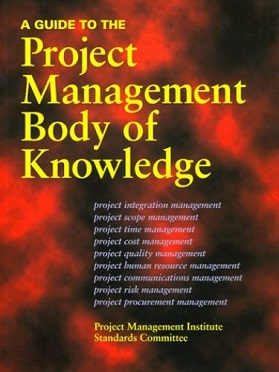Project Management Body of Knowledge
Project Management Body of Knowledge
The Project Management Body of Knowledge (PMBOK) is a set of standard terminology and guidelines (a body of knowledge) for project management. The PMBOK Guide is published by the Project Management Institute (PMI). The guide is a document resulting from work overseen by the PMI, which offers a fundamental resource for effective project management in any industry.
Overview[edit | edit source]
The PMBOK Guide provides project managers with the fundamental practices needed to achieve organizational results and excellence in the practice of project management. It is widely recognized as a standard for managing most projects and is an essential resource for the Project Management Professional (PMP) certification.
History[edit | edit source]
The first edition of the PMBOK Guide was published in 1996. Since then, it has undergone several updates to reflect the evolving nature of project management. The most recent edition, the seventh edition, was released in 2021.
Structure[edit | edit source]
The PMBOK Guide is structured into several sections, each focusing on different aspects of project management:
1. Introduction[edit | edit source]
This section provides an overview of the PMBOK Guide, including its purpose, structure, and the importance of project management.
2. The Standard for Project Management[edit | edit source]
This section outlines the standard for project management, including the principles and performance domains that are essential for effective project management.
3. Project Performance Domains[edit | edit source]
The PMBOK Guide identifies several performance domains that are critical for project success. These include:
- Stakeholder Performance Domain
- Team Performance Domain
- Development Approach and Life Cycle Performance Domain
- Planning Performance Domain
- Project Work Performance Domain
- Delivery Performance Domain
- Measurement Performance Domain
- Uncertainty Performance Domain
4. Tailoring[edit | edit source]
This section discusses the importance of tailoring project management practices to fit the specific needs of the project and the organization.
5. Models, Methods, and Artifacts[edit | edit source]
This section provides a comprehensive list of models, methods, and artifacts that can be used to support project management activities.
Key Concepts[edit | edit source]
The PMBOK Guide introduces several key concepts that are essential for effective project management:
- Project Life Cycle: The series of phases that a project goes through from initiation to closure.
- Project Management Processes: The processes that are used to manage a project, which are grouped into five process groups: Initiating, Planning, Executing, Monitoring and Controlling, and Closing.
- Knowledge Areas: The areas of project management that are required for effective project management, including Integration Management, Scope Management, Schedule Management, Cost Management, Quality Management, Resource Management, Communications Management, Risk Management, Procurement Management, and Stakeholder Management.
Related Pages[edit | edit source]
- Project Management
- Project Management Institute
- Project Management Professional
- Project Life Cycle
- Project Management Processes
- Knowledge Areas in Project Management
Categories[edit | edit source]
Search WikiMD
Ad.Tired of being Overweight? Try W8MD's physician weight loss program.
Semaglutide (Ozempic / Wegovy and Tirzepatide (Mounjaro / Zepbound) available.
Advertise on WikiMD
|
WikiMD's Wellness Encyclopedia |
| Let Food Be Thy Medicine Medicine Thy Food - Hippocrates |
Translate this page: - East Asian
中文,
日本,
한국어,
South Asian
हिन्दी,
தமிழ்,
తెలుగు,
Urdu,
ಕನ್ನಡ,
Southeast Asian
Indonesian,
Vietnamese,
Thai,
မြန်မာဘာသာ,
বাংলা
European
español,
Deutsch,
français,
Greek,
português do Brasil,
polski,
română,
русский,
Nederlands,
norsk,
svenska,
suomi,
Italian
Middle Eastern & African
عربى,
Turkish,
Persian,
Hebrew,
Afrikaans,
isiZulu,
Kiswahili,
Other
Bulgarian,
Hungarian,
Czech,
Swedish,
മലയാളം,
मराठी,
ਪੰਜਾਬੀ,
ગુજરાતી,
Portuguese,
Ukrainian
Medical Disclaimer: WikiMD is not a substitute for professional medical advice. The information on WikiMD is provided as an information resource only, may be incorrect, outdated or misleading, and is not to be used or relied on for any diagnostic or treatment purposes. Please consult your health care provider before making any healthcare decisions or for guidance about a specific medical condition. WikiMD expressly disclaims responsibility, and shall have no liability, for any damages, loss, injury, or liability whatsoever suffered as a result of your reliance on the information contained in this site. By visiting this site you agree to the foregoing terms and conditions, which may from time to time be changed or supplemented by WikiMD. If you do not agree to the foregoing terms and conditions, you should not enter or use this site. See full disclaimer.
Credits:Most images are courtesy of Wikimedia commons, and templates, categories Wikipedia, licensed under CC BY SA or similar.
Contributors: Prab R. Tumpati, MD

